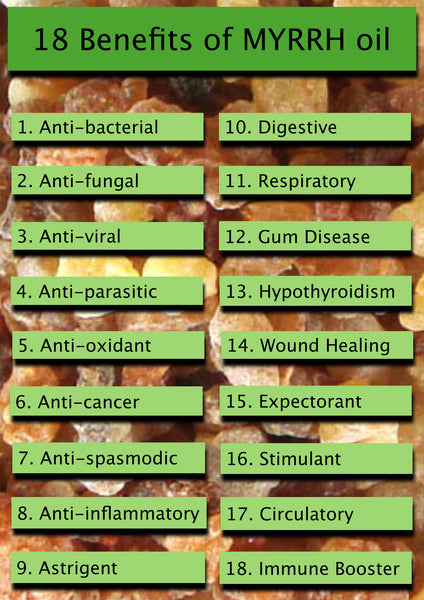Benefits of MYRRH essential oil
Benefits of MYRRH essential oil

When most people hear of myrrh essential oil (Commiphora myrrha) they are reminded of the stories they heard in Sunday School, but rarely do they know why myrrh oil has been used and revered for over 5,000 years. Even before the science confirmed it, the wise men knew of the health properties, benefits, and uses of these sacred oils. Myrrh is extracted by steam distilling the resin of the plant. It has a warm, earthy, and balsamic aroma that is quite hard to describe but easy to recognize.
What Is Myrrh Oil?
Myrrh oil comes from a dried resin extracted from the Commiphora myrrha tree, which belongs to the Commiphora plant genus. Like frankincense, myrrh comes from the Burseraceae plant family. Native to Northern Africa and the Middle East, particularly in Somalia, Ethiopia, Arabia, and Yemen, the tree grows up to five meters high, and can be identified by its light bark, knotted branches and small white flowers. The word "myrrh" comes from "murr," which means "bitter" in Arabic, probably referring to the resin's bitter taste.
To extract myrrh, the bark of the tree is cut, and a yellow sap comes out. This sap dries into reddish-brown, walnut-sized lumps, with a unique sweet and smoky aroma, that are then used to make myrrh oil. Myrrh oil has a golden yellow or brownish color, and a rich, smoky and balsamic aroma.
Composition of Myrrh Oil
Two primary active compounds are found in myrrh, called terpenoids and sesquiterpenes, both of which have anti-inflammatory and antioxidant effects. Sesquiterpenes specifically also have an effect on our emotional center in the hypothalamus, helping us remain calm and balanced. Both of these compounds are under investigation for their anticancer, antibacterial benefits as well as other potential therapeutic uses.
Other components of myrrh include alpha pinene, cadinene, dipentene, limonene, eugenol, cuminaldehyde, m-cresol, cinnamaldehyde, acetic acid, formic acid, and heerabolene.Myrrh Oil Benefits & Uses
Myrrh oil is still commonly used today as a remedy for a variety of ailments. Researchers have become interested in myrrh due to its potent antioxidant activity and potential as a cancer treatment. It has also been shown to be effective in fighting certain types of parasitic infections.

Myrrh Oil Benefits
Myrrh oil has many potential benefits, although further research is needed to determine exact mechanisms of how it works and dosages for therapeutic benefits. Here are some of the main benefits of myrrh oil use:
1. Potent Antioxidant
A 2010 study in the journal of Food and Chemical Toxicology found that myrrh could protect against liver damage due to its high antioxidant capacity. Although this particular study was conducted with rabbits, there is some potential for uses in humans also.
2. Anti-Cancer Benefits
Myrrh has also been found to have anti-cancer benefits. A 2011 found that myrrh was able to reduce the proliferation or replication of human cancer cells. Researchers found that myrrh inhibited growth in eight different types of cancer cells, specifically gynecological cancers. Although further research is needed to determine exactly how to use myrrh for cancer treatment, this initial research is promising.


3. Anti-Bacterial and Anti-Fungal Benefits Historically, myrrh was used to treat wounds and prevent infections. It can still be used in this manner on minor skin irritations such as athlete’s foot, ring worm, and acne. Apply a few drops to a clean towel first before applying it directly to the skin.
4. Anti-Parasitic
A medication has been developed using myrrh as a treatment for fascioliasis infection, a parasite that has been infecting humans worldwide. This parasite is generally transmitted by ingesting aquatic algae and other plants. A medication made with myrrh was able to decrease symptoms of the infection, as well as a drop in parasite egg count found in the feces.
5. Skin Health
Maintaining healthy skin is one of myrrh oil's renowned uses, as it prevents the signs of aging and soothes cracked or chapped skin. This is why it's commonly added to many skin care products today.
6. Relaxation
Myrrh is commonly used in aromatherapy for massages. It can also be added to a warm bath or applied directly to the skin.
 7. Respiratory problems - Myrrh oil works well against coughs, colds, and sore throat. It also helps relieve congestion and expel phlegm.
7. Respiratory problems - Myrrh oil works well against coughs, colds, and sore throat. It also helps relieve congestion and expel phlegm.
8. Digestive ailments – It promotes digestive health and helps cure problems like stomach upset, diarrhea, dyspepsia, indigestion, flatulence and hemorrhoids.
9. Gum and mouth diseases – It helps relieve toothache, gingivitis, and mouth ulcers, and also freshens your breath. Myrrh oil is even used as a natural ingredient in mouthwashes and toothpaste.
10. Immune system health - It strengthens and activates your immune system to keep your body protected from infections.
Myrrh Oil Uses
Essential oil therapy has been used for thousands of years and is the practice of using oils for their health benefits. Each essential oil has its own unique benefit and can be incorporated as an alternative treatment to a variety of ailments.
 Generally, oils are inhaled, sprayed in the air, massaged into the skin, and at times taken by mouth. Fragrances are strongly connected to our emotions and memories as our scent receptors are located next to the emotional centers in our brain, the amygdala and hippocampus.
Generally, oils are inhaled, sprayed in the air, massaged into the skin, and at times taken by mouth. Fragrances are strongly connected to our emotions and memories as our scent receptors are located next to the emotional centers in our brain, the amygdala and hippocampus.
Myrrh Side Effects
Myrrh does have some side effects that need to be considered before using it therapeutically. As always, it is best to speak to your doctor or trusted healthcare provider first.
Since one of the most common myrrh oil uses is topical, people with sensitive skin should be cautious. Myrrh has been found to cause dermatitis, or inflammation of the skin, in some people. Always test it first in a small area before applying it all over the skin to make sure you don’t have any allergic reaction.
- If taken internally, myrrh may cause stomach upset and diarrhea. Although it is generally not serious, chronic diarrhea can lead do dehydration, so discontinue its use if you are experiencing gastrointestinal problems.
- Pregnant women should avoid taking myrrh because it may enhance uterine contractions.
- Another potential side effect of myrrh is heart irregularities and lowered blood pressure, although this is mostly seen at high doses of more than 2-4 grams per day. Anyone with a medical condition related to the heart should ask a doctor before using myrrh oil.
- Myrrh may lower blood sugar, therefore it is not recommended for people with diabetes or other blood sugar conditions. Since it interacts with blood glucose it is also not recommended for people undergoing surgery and it is best to stop its use at least 2 weeks before surgery.
- Myrrh oil is not recommended for people using anticoagulants such as Warfarin as it may have potential interactions with this medication. It is also not recommended for people on diabetes medication, as there is a potential for a drug interaction.
References:
http://draxe.com/myrrh-oil/

